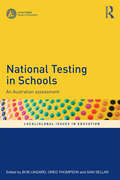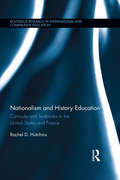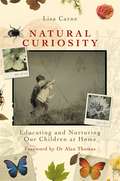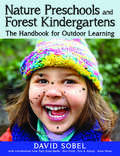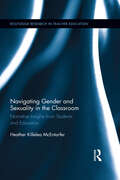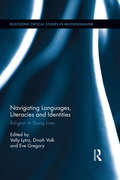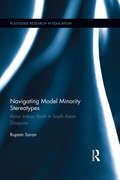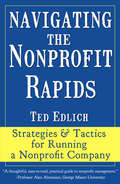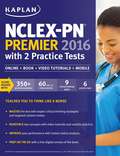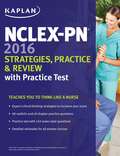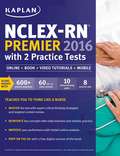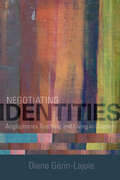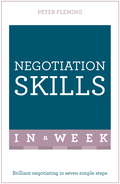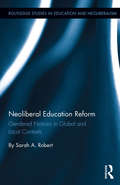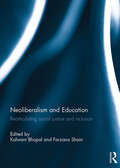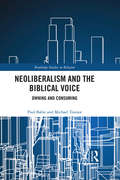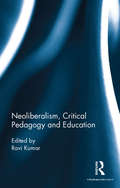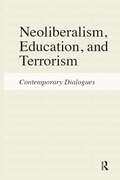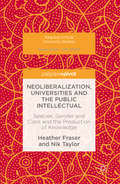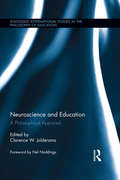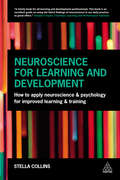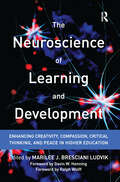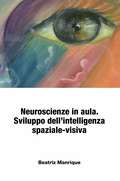- Table View
- List View
National Testing in Schools: An Australian assessment (Local/Global Issues in Education)
by Bob Lingard Sam Sellar Greg ThompsonOver the last two decades, large-scale national, or provincial, standardised testing has become prominent in the schools of many countries around the globe. National Testing in Schools: An Australian Assessment draws on research to consider the nature of national testing and its multiple effects, including: media responses and constructions such as league tables of performance pressures within school systems and on schools effects on the work and identities of principals and teachers and impacts on the experience of schooling for many young people, including those least advantaged. Using Australia as the case site for global concerns regarding national testing, this book will be an invaluable companion for education researchers, teacher educators, teacher education students and teachers globally.
Nationalism and History Education: Curricula and Textbooks in the United States and France (Routledge Research in International and Comparative Education)
by Rachel D. HutchinsHistory education, by nature, transmits an ‘official’ version of national identity. National identity is not a fixed entity, and controversy over history teaching is an essential part of the process of redefining and regenerating the nation. France and the United States have in particular experienced demographic and cultural shifts since the 1960s that have resulted in intense debates over national identity. This volume examines how each country’s national history is represented in primary schools’ social studies textbooks and curricula, and how they handle contemporary issues of ethnicity, diversity, gender, socio-economic inequality, and patriotism. By analyzing each country separately and comparatively, it demonstrates how various groups (including academics, politicians and citizen activists) have influenced education, and how the process of writing and rewriting history perpetuates a nation. Drawing on empirical studies of the United States and France, this volume provides insight into broader nationalist processes and instructive principles for similar countries in the modern world.
Natural Curiosity: Educating and Nurturing Our Children at Home
by Lisa Carne Dr Alan ThomasNatural Curiosity is a warm and contemplative insight into one family's experience of moving from mainstream schooling to home education, and learning through the lens of nature and natural history. Since becoming 'unschooled', the two children have thrived on a diet of self-directed play and learning, amassing life skills, confidence, responsibility, and a vast array of knowledge along the way. This thoughtful book touches upon important themes in education and environmentalism, such as children's rights in schooling, the use and place of technology in learning, and the absence of the natural world in mainstream education. It gives a considered, balanced view of home schooling, interspersed with entertaining tales including constructing life-sized mammoth skeletons and living for a day as historically accurate Vikings. It offers an understanding of how this type of education works and what inspires the choice to pursue it.
Natural Curiosity: Educating and Nurturing Our Children at Home
by Lisa CarneNatural Curiosity is a warm and contemplative insight into one family's experience of moving from mainstream schooling to home education, and learning through the lens of nature and natural history.Since becoming 'unschooled', the two children have thrived on a diet of self-directed play and learning, amassing life skills, confidence, responsibility, and a vast array of knowledge along the way. This thoughtful book touches upon important themes in education and environmentalism, such as children's rights in schooling, the use and place of technology in learning, and the absence of the natural world in mainstream education. It gives a considered, balanced view of home schooling, interspersed with entertaining tales including constructing life-sized mammoth skeletons and living for a day as historically accurate Vikings. It offers an understanding of how this type of education works and what inspires the choice to pursue it.
Nature Preschools and Forest Kindergartens
by David Sobel Patti Bailie Ann Stires Ken Finch Erin KennyEnvironmental education expert David Sobel joins with a variety of colleagues to share their experiences and steps for creating a successful forest kindergarten program. Nature Preschools and Forest Kindergartens walks you through the European roots of the concept to the recent resurgence of these kinds of programs in North America.Going well beyond a history lesson, these experts provide the framework to understand the concepts and build a learning community that stimulates curiosity and inquisitiveness in a natural environment. This helpful guide provides the curriculum, ideas, and guidance needed to foster special gifts in children. It also gives you the nuts and bolts of running a successful nature preschool business, such as potential obstacles, staff and curriculum design, best practices for success, site and facility management, and business planning.Nature Preschools and Forest Kindergartens provides the mentorship and guidance to become a leader in nature-based education.David Sobel has spent the last twenty-five years working in the field of child development, place-based education, and parenting with nature. He currently serves as senior faculty in the education department at Antioch University New England in Keene, New Hampshire. His expertise and passion have led him to authoring seven books and being identified as one of the "gurus and rock stars of environmental education" by Teacher magazine.
Navigating Gender and Sexuality in the Classroom: Narrative Insights from Students and Educators (Routledge Research in Teacher Education)
by Heather Killelea McEntarferGender identity and sexuality play crucial roles in the educational experiences of students, parents, and teachers. Teacher education must more directly address the ways that schools reflect and reproduce oppressive gender norms, working to combat homophobia, transphobia, heteronormativity, and gendered expectations in schools. This volume examines teacher candidates’ experiences with gender and sexuality in the classroom, offering insight and strategies to better prepare teachers and teacher educators to support LGBTQ youth and families. This volume addresses the need for broader, more in-depth qualitative data describing teacher candidates’ responses to diversity in the classroom (including gender, sexuality, race, class and religion). By using pedagogical tools such as narrative writing and positioning theory, teacher candidates explore these issues to better understand their own students’ narratives in deeply embodied ways. This book calls for schools to be places where oppression, in all its complexity, is explored and challenged rather than replicated.
Navigating Languages, Literacies and Identities: Religion in Young Lives (Routledge Critical Studies in Multilingualism)
by Eve Gregory Vally Lytra Dinah VolkNavigating Languages, Literacies and Identities showcases innovative research at the interface of religion and multilingualism, offering an analytical focus on religion in children and adolescents’ everyday lives and experiences. The volume examines the connections between language and literacy practices and social identities associated with religion in a variety of sites of learning and socialization, namely homes, religious education classes, places of worship, and faith-related schools and secular schools. Contributors engage with a diverse set of complex multiethnic and religious communities, and investigate the rich multilingual, multiliterate and multi-scriptal practices associated with religion which children and adolescents engage in with a range of mediators, including siblings, peers, parents, grandparents, religious leaders, and other members of the religious community. The volume is organized into three sections according to context and participants: (1) religious practices at home and across generations, (2) religious education classes and places of worship and (3) bridging home, school and community. The edited book will be a valuable resource for researchers in applied linguistics, linguistic anthropology, socio-linguistics, intercultural communication, and early years, primary and secondary education.
Navigating Model Minority Stereotypes: Asian Indian Youth in South Asian Diaspora (Routledge Research in Education #146)
by Rupam SaranThough Asian Indians are typically thought of as a "model minority", not much is known about the school experiences of their children. Positive stereotyping of these immigrants and their children often masks educational needs and issues, creates class divides within the Indian-American community, and triggers stress for many Asian Indian students. This volume examines second generation (America-born) and 1.5 generation (foreign-born) Asian Indians as they try to balance peer culture, home life and academics. It explores how, through the acculturation process, these children either take advantage of this positive stereotype or refute their stereotyped ethnic image and move to downward mobility. Focusing on migrant experiences of the Indian diasporas in the United States, this volume brings attention to highly motivated Asian Indian students who are overlooked because of their cultural dispositions and outlooks on schooling, and those students who are more likely to underachieve. It highlights the assimilation of Asian Indian students in mainstream society and their understandings of Americanization, social inequality, diversity and multiculturalism.
Navigating the Nonprofit Rapids: Strategies & Tactics for Running a Nonprofit Company
by Ted EdlichAre you looking to make a real difference in your community? Are you in academia looking for a textbook for teaching students who are studying nonprofit leadership? Do you have a passion to bring about change that will benefit others? Are you looking for a way to harness that passion and give it some organizational muscle and backbone? Are you on the hunt for a career you love, not just work that pays the bills? Are you involved in a nonprofit that is not living up to its potential? Then this book is for you! Discover the lessons of great nonprofit leadership that will sharpen your vision, give it structure that works, and make it a force to be reckoned with. You'll be excited and inspired by those like yourself who have done extraordinary work. With Navigating the Nonprofit Rapids, you'll discover lessons that have immediate application, and that making a difference is the real adventure of a lifetime.
NCLEX-PN Premier 2016 with 2 Practice Tests: Online + Book + Video Tutorials + Mobile
by KaplanPass the NCLEX-PN! Passing the NCLEX-PN exam is not just about what you know--it's about how you think. With expert critical thinking strategies and targeted practice, Kaplan's NCLEX-PN Premier 2016 with 2 Practice Tests shows you how to leverage your content knowledge to think like a nurse. Features: * 9 critical thinking paths to break down what exam questions are asking * 6 end-of-chapter practice sets to help you put critical thinking principles into action * 2 full-length practice tests to gauge your progress--one online, one in the book * Detailed rationales for all answer choices, correct and incorrect * 60 minutes of video tutorials * Techniques for mastering the computer adaptive test * Digital version of the book for mobile study * Streamlined content review, organized along the exam's "Client Needs" framework * Review of all question types, including alternate-format questions With efficient test prep via online + book + videos + mobile, Kaplan's NCLEX-PN Premier 2016 with 2 Practice Tests will make you assured and confident on test day.
NCLEX-RN 2016 Strategies, Practice and Review with Practice Test
by KaplanPass the NCLEX-RN! Passing the NCLEX-RN exam is not just about what you know--it's about how you think. With expert critical thinking strategies and targeted practice, Kaplan's NCLEX-RN 2016 Strategies, Practice & Review with Practice Test shows you how to leverage your content knowledge to think like a nurse.Features: * 10 critical thinking paths to break down what exam questions are asking* 8 end-of-chapter practice sets to help you put critical thinking principles into action* Streamlined content review, organized along the exam's "Client Needs" framework* Review of all question types, including alternate-format questions* Full-length practice test* Detailed rationales for all answer choices, correct and incorrect* Techniques for mastering the computer adaptive testWith expert strategies and the most test-like questions anywhere, Kaplan's NCLEX-RN 2016 Strategies, Practice & Review with Practice Test will make you assured and confident on test day.
NCLEX-RN Premier 2016 with 2 Practice Tests: Online + Book + Video Tutorials + Mobile
by KaplanTeaches you to think like a nurse Pass the NCLEX-RN! Passing the NCLEX-RN exam is not just about what you know--it's about how you think. With expert critical thinking strategies and targeted practice, Kaplan's NCLEX-RN Premier 2016 with 2 Practice Tests shows you how to leverage your content knowledge to think like a nurse. Features:* 10 critical thinking paths to break down what exam questions are asking* 8 end-of-chapter practice sets to help you put critical thinking principles into action* 2 full-length practice tests to gauge your progress--one online, one in the book* Detailed rationales for all answer choices, correct and incorrect * 60 minutes of video tutorials* Techniques for mastering the computer adaptive test* Digital version of the book for mobile study* Streamlined content review, organized along the exam's "Client Needs" framework* Review of all question types, including alternate-format questions
Negotiating Identities: Anglophones Teaching and Living in Quebec
by Diane Gerin-LajoieAs members of an official linguistic minority in Canada, Anglophone teachers living and working in Quebec have a distinct experience of the relationship between language and identity. In Negotiating Identities, Diane Gérin-Lajoie uses survey data and the life stories of Anglophone teachers to illustrate the social practices which connect them with their linguistic, cultural, and professional identities.Exploring the complexity of identity as a lived experience, Negotiating Identities demonstrates the strength of language as a political force in these educators' lives both in the classroom and outside it. Through comparisons with the other official linguistic minority in Canada, the Francophones, and particularly with Franco-Ontarians, this book tells the stories of Quebec's Anglophone teachers in their own words, providing a unique account of how these individuals make sense of their lives as residents of Quebec.
Negotiation Skills In A Week: Brilliant Negotiating In Seven Simple Steps
by Peter FlemingEffective negotiation skills just got easierThere was a time, not that long ago, when negotiation was seen, in the main, as the province of industrial relations folk and car-sales advisers. But, no longer! Repeated financial crises have squeezed profit margins and, in some markets, discouraged buyers from making marginal purchases or continuing habitual expenditure. Managers have found themselves in the frontline of the expectation to achieve better value for money, and the starting point for this is to shop around and explore the offers made by new suppliers, and/or to negotiate better deals with existing suppliers.Even if your job doesn't involve negotiation, then you might still be an active negotiator when replacing your car, moving house or even selling last season's wardrobe! The truth is that being a good negotiator has become a life skill, enabling those who are good at it not just to save money, but also to upgrade their computer, television or lawnmower with little or no increase in outgoings - and enhancing their reputation in the process.Becoming an effective negotiator is certainly within the scope of the majority of people. At its simplest, it involves thinking out what you want, planning how you'd like to get it and developing your powers of persuasion to convince other people that you are simply being reasonable.This book will help you to plan to become a better negotiator through being better prepared for meetings, planning clear and realistic objectives for a negotiation, maintaining concentration and making logical proposals that create agreement in the other party.- Sunday: Creating the right environment- Monday: Researching your objectives - Tuesday: People and places - Wednesday: Breaking the ice - Thursday: The agenda - Friday: Concluding- Saturday: Learning from your experiences
Neoliberal Education Reform: Gendered Notions in Global and Local Contexts (Routledge Studies in Education, Neoliberalism, and Marxism)
by Sarah A. RobertThe restructuring of teaching is a global issue, the result of a transnational movement of policy. Gender shapes the occupational reform and binds the global-to-the-local movement of reform ideas. Gender is also implicated in how policy is done and how it leads to particular outcomes. This volume examines the behind-the-scenes work done to make sense of reform and implement it during the workday and questions the new forms and controls over teaching reforms—the labor process—revealed to understand the implications of neoliberal education reform on teachers’ work. Based on ethnographic research undertaken at public high schools in Argentina, this volume introduces the everyday work lives of teachers. It includes interviews and observations revealing what it means to be a teacher in the reform context, and explores the ways masculinities and femininities shape teachers’ decision-making about reforms. At a time when teachers are at the center of political controversy around the world, this volume is an important reminder that school change is about changing the work of teachers.
Neoliberalism and Education: Rearticulating Social Justice and Inclusion
by Kalwant Bhopal and Farzana ShainNeoliberalism and Education: Rearticulating Social Justice and Inclusion offers a critical reflection on the establishment of neoliberalism as the new global orthodoxy in the field of education, and considers what this means for social justice and inclusion. It brings together writers from a number of countries, who explore notions of inclusion and social justice in educational settings ranging from elementary schools to higher education. Contributors examine policy, practice, and pedagogical considerations covering different dimensions of (in)equality, including disability, race, gender, and class. They raise questions about what social justice and inclusion mean in educational systems that are dominated by competition, benchmarking, and target-driven accountability, and about the new forms of imperialism and colonisation that both drive, and are a product of, market-driven reforms. While exposing the entrenchment, under current neoliberal systems of educational provision, of longstanding patterns of (racialised, classed, and gendered) privilege and disadvantage, the contributions presented in this book also consider the possibilities for hope and resistance, drawing attention to established and successful attempts at democratic education or community organisation across a number of countries. This book was originally published as a special issue of the British Journal of Sociology of Education.
Neoliberalism and the Biblical Voice: Owning and Consuming (Routledge Studies in Religion)
by Paul Babie Michael TrainorThis book compares our contemporary preoccupation with ownership and consumption with the role of property and possessions in the biblical world, contending that Christian theology provides a valuable entry point to discussing the issue of private property—a neoliberal tool with the capacity to shape the world in which we live by exercising control over the planet’s resources. Babie and Trainor draw on the teaching on property and possessions of Jesus of Nazareth. They demonstrate how subsequent members of the Jesus movement—the writers of early collection of Jesus sayings (called ‘Q’), and the gospels of Mark and Luke—reformulated Jesus’ teaching for different contexts that was radical and challenging for their own day. Their view of wealth and possessions continues today to be as relevant as ever. By placing the insights of the Galilean Jesus and the early Jesus movement into conversation with contemporary views on private property and consumer culture, the authors develop legal, philosophical and theological insights, what they describe as ‘seven theses’, into how our desire for ethical living fares in the neoliberal marketplace.
Neoliberalism, Critical Pedagogy and Education
by Ravi KumarThis volume examines the role of neoliberalism and its impact on education in South Asia. It contends that education is in a state of crisis across the world. This is reflected not only in the way the state has withdrawn to pave way for private capital but also in the manner in which knowledge and ways of understanding the world are being challenged by manipulation and adverse influences. A process of ‘factoryisation’ is underway as disciplining of human minds and redefinition of the purpose of human existence are being geared to fall in line with the needs of private capital. The book brings together incisive contributions from India, Sri Lanka, Pakistan and Nepal to explore newer possibilities to deal with the educational crisis, and looks at a range of critical themes in education: pedagogy, teacher–learner relationship, teacher education, the state of the university, and policy. Rich in content, critical and insightful, this book will be a valuable addition for scholars and researchers of education and education policy, sociology, public policy and South Asian Studies.
Neoliberalism, Education, and Terrorism: Contemporary Dialogues
by Henry A. Giroux Kenneth J. Saltman Sophia A Mcclennen Jeffrey R. Di LeoNeoliberalism, Education, Terrorism: Contemporary Dialogues is a collaborative effort among four established public intellectuals who deeply care about the future of education in America and who are concerned about the dangerous effects of neoliberalism on American society and culture. It aims to provide a clear, concise, and thought-provoking account of the problems facing education in America under the dual shadows of neoliberalism and terrorism. Through collaborative and individual essays, the authors provide a provocative account that will be of interest to anyone who concerning with the opportunities and dangers facing the future of education at this critical moment in history.
Neoliberalization, Universities and the Public Intellectual
by Heather Fraser Nik TaylorThis book employs an an intersectional feminist approach to highlight how research and teaching agendas are being skewed by commercialized, corporatized and commodified values and assumptions implicit in the neoliberalization of the academy. The authors combine 50 years of academic experience and focus on species, gender and class as they document the hazardous consequences of seeing people as instruments and knowledge as a form of capital. Personal-political examples are provided to illustrate some of the challenges but also opportunities facing activist scholars trying to resist neoliberalism. Heartfelt, frank, and unashamedly emotional, the book is a rallying cry for academics to defend their role as public intellectuals, to work together with communities, including those most negatively affected by neoliberalism and the corportatization of knowledge.
Neuroscience and Education: A Philosophical Appraisal (Routledge International Studies in the Philosophy of Education)
by Clarence W. JoldersmaThis volume makes a philosophical contribution to the application of neuroscience in education. It frames neuroscience research in novel ways around educational conceptualizing and practices, while also taking a critical look at conceptual problems in neuroeducation and at the economic reasons driving the mind-brain education movement. It offers alternative approaches for situating neuroscience in educational research and practice, including non-reductionist models drawing from Dewey and phenomenological philosophers such as Martin Heidegger and Merleau-Ponty. The volume gathers together an international bevy of leading philosophers of education who are in a unique position to contribute conceptually rich and theoretically framed insight on these new developments. The essays form an emerging dialogue to be used within philosophy of education as well as neuroeducation, educational psychology, teacher education and curriculum studies.
Neuroscience for Learning and Development
by Stella CollinsNeuroscience for Learning and Development is about the psychology and neuroscience that underpins effective and successful training and learning. It introduces the latest research and concepts and suggests practical tools, techniques and ideas to improve how trainers train and how people learn. Readers will find new and more effective ways of working and will discover a sound basis for good practice. They will also discover the research that backs up what they are already doing well and evidence to support future projects and plans in order to make a convincing case to budget holders. Neuroscience for Learning and Development covers the design and delivery of face-to-face, online and virtual learning as well as how to create environments which make learning easier. It provides evidence to stop training and learning being seen as 'soft and fluffy' and will help trainers and L&D teams persuade the rest of their organization of their value. This book explains the science behind creative training delivery so that learners will be motivated, enjoy training, pay attention, remember what they learn and be able to apply it back at work. It explains the neuroscience of attention, memory and habits and how to make sure people learn what they need to learn. Readers will be able to distinguish the neuromyths from the neuroscience and will find out which elements of brain science offer evidence for current practice and as well as discovering new ideas to continue to develop their skills and practice.
The Neuroscience of Learning and Development: Enhancing Creativity, Compassion, Critical Thinking, and Peace in Higher Education (An\acpa / Naspa Joint Publication)
by Gavin W. Henning Ralph Wolff Marilee J. Bresciani LudvikIs higher education preparing our students for a world that is increasingly complex and volatile, and in which they will have to contend with uncertainty and ambiguity? Are we addressing the concerns of employers who complain that graduates do not possess the creative, critical thinking, and communication skills needed in the workplace? This book harnesses what we have learned from innovations in teaching, from neuroscience, experiential learning, and studies on mindfulness and personal development to transform how we deliver and create new knowledge, and indeed transform our students, developing their capacities for adaptive boundary spanning.Starting from the premise that our current linear, course-based, educational practices are frequently at odds with how our neurological system facilitates learning and personal development, the authors set out an alternative model that emphasizes a holistic approach to education that integrates mindful inquiry practice with self-authorship and the regulation of emotion as the cornerstones of learning, while demonstrating how these align with the latest discoveries in neuroscience. The book closes by offering practical ideas for implementation, showing how simple refinements in classroom and out-of-classroom experiences can create foundations for students to develop key skills that will enhance adaptive problem solving, creativity, overall wellbeing, innovation, resilience, compassion, and ultimately world peace.Co-published with ACPA – College Student Educators International
Neuroscienze in aula. Sviluppo dell’intelligenza spaziale-visiva.
by Beatriz Manrique Giuseppina De VitaL’obiettivo centrale del testo è quello di facilitare l’accesso al discorso sulla neuroscienza e come utilizzarla in aula, principalmente attraverso lo sviluppo dell’intelligenza spaziale-visiva proposta tanto da Gardner come da Beauport, due teorici delle intelligenze multiple. Si sviluppa l’uso della visualizzazione, l’abilità per arrivare all’astrazione degli spazi, come opzione di attività in classe progettate nell’ottica di un’educazione integrale. I temi presentati sono organizzati in nove parti: l’introduzione, un’intervista a una famosa maestra, la bilateralità cerebrale, un modello di analisi che parte dall’insegnamento delle lingue, il lavoro con le immagini, l’intelligenza visiva e la creatività, le immagini in aula, una proposta di attività con immagini e le conclusioni. In ciascuna parte si sviluppano differenti aspetti relazionati all’applicazione delle neuroscienze in una classe di lingue straniere, ma solo come esempio di applicazione poiché che l’obiettivo dell’autrice è di presentare, in maniera chiara, l’applicabilità della neuroscienza a tutte le aree di insegnamento e con molti esempi che facilitino l’estrapolazione dell’informazione ad altri campi. L’intervista con una maestra venezuelana di larghe vedute - Alicia Steiner – è uno dei migliori esempi, poiché mostra di fatto che quando si vuole, ci si prepara e si agisce, si raggiungono gli obiettivi. Le pratiche che vengono suggerite e gli esercizi che vengono descritti sono stati utilizzati in aula dalla stessa autrice, che offre la possibilità di espandere il loro utilizzo ad altre aree. Infine, nel testo sono raccolte varie attività visive come esempi di possibile utilizzo nel primo giorno di lezione. Le conclusioni includono, inoltre, riflessioni su tutto il processo del lavoro del docente secondo questo metodo.
